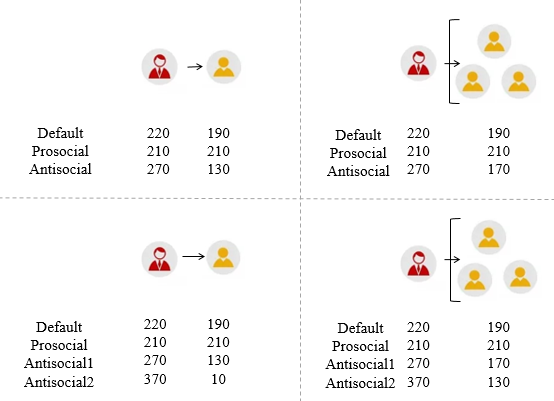Does power corrupt the mind? The influence of power on moral reasoning and self-interested behaviour

By Laura M. Giurge, Marius van Dijke, Michelle Xue Zheng, and David De Cremer
“I didn't set out to commit a crime. I certainly didn't set out to hurt anyone. When I was working at Enron, you know, I was kind of a hero, because I helped the company make its numbers every quarter. And I thought I was doing a good thing. I thought I was smart. But I wasn't.”
Andy Fastow – former CFO of Enron (Elkind, 2013)
Power can bring many benefits to those who have it, such as access to valuable resources or decision autonomy. However, the above example is one out of many real life cases suggesting that it may also corrupt. As such, it is important to understand how power influences leaders’ engagement in self-interested behaviour (i.e., behaviour that benefits the self at the expense of others). At the same time, it is also worth investigating whether power shapes thinking about moral issues, a process known as moral reasoning, as a possible mechanism that may explain why power leads to more self-interested behaviour.
Power corrupts moral reasoning
Power is the amount of discretion and means that one has to influence others in line with one’s own will. Based on this definition, power entails two aspects: a) power to enforce one’s will, refers to the amount of discretion that leaders have to enforce their will over others; b) power over others, refers to how many followers are dependent on and affected by the leaders’ actions. High power therefore means, for example, having more options to choose from and influence over more followers.
The most influential theory on moral reasoning is Lawrence Kohlberg’s theory of moral development in which he argued that an individual’s judgment of what is morally right or wrong is influenced by how he or she reasons about moral issues. One main target of criticism has been Kohlberg’s argument that moral reasoning develops from childhood onwards one stage at a time, in an upward, progressive manner and without skipping a stage or regressing to a previously acquired stage. In fact, some studies have found signs of stage regression, such as instances where managers used less principled structures of moral reasoning when responding to dilemmas that involved a business (compared with a non-business) decision or those which involved psychological (rather than physical) harm. Based on such findings, researchers have proposed to instead view moral development as an expansion of structures in which individuals do not abandon their previously acquired moral reasoning structures. Moral development may therefore be relatively flexible and potentially affected by socio-contextual factors – such as power – that reside outside the content of the dilemma.
Power also enables the power holder to engage in self-interested behaviour. Prior research, for example, has found that power increased individuals’ tendency to use information to their personal advantage, to make decisions that increased their own payouts at the expense of their followers, or to engage in unethical behaviour (e.g., lying) when it benefited the self. Other studies have shown that, as power increased, individuals tended to shift from reliance on a rule-based moral framework to an outcome-based moral framework when a decision would benefit the power holder.
Experiment design
In order to learn more about power, self-interest, and moral reasoning, we enlisted 445 undergraduate business students from a medium-sized European university to participate in an experiment. We randomly assigned 177 out of these participants to one of four leader conditions (power over: 1 vs. 3 followers; power to: 3 vs. 4 payout options) and the remaining students to the follower role.
We operationalised self-interested behaviour as the decision that leaders made in terms of payouts for themselves and for their followers. The leader would be paid slightly more than the follower in the default option (“Option 1”), whereas the payouts for the leader and the follower would be the same at a cost incurred by the leader for “Option 2” (prosocial option). “Option 3” and “Option 4” represent progressively higher payouts for the leader, but also an erosion of the public surplus by decreasing the payouts to the follower(s).

What’s more, in the experiment, participants were presented with a number of fictional dilemmas (e.g. one dilemma is whether or not a doctor should administer an overdose of painkillers to a patient in pain). We asked them to make choices in these dilemmas. We then derived a score (called a ‘P-score’) representing the percentage of items comprising Kohlberg’s principled reasoning stages as an overall measure of moral reasoning. This P-score indicates the degree to which individuals place great importance on post-conventional and principled considerations when making a decision. A higher P-score represents a less self-centered and a more principled structure of moral reasoning.
Results and practical implications
We found that participants who had power over more (vs. fewer) followers, were less likely to use moral reasoning structures that emphasised considerations of justice and care for the collective well-being. Participants who were given more (vs. fewer) payout options to enforce their will over their followers, however, did not differ in how they reasoned about moral issues, but they did have a higher tendency to engage in self-interested behaviour. We further found suggestive evidence that having power over more followers indirectly increased self-interested behaviour, via the use of less principled moral reasoning structures.
From a practical perspective, understanding the impact of power on moral reasoning and self-interested behaviour is important for various reasons. First, decisions about moral issues are often made in asymmetric and unequal-power relationships that heightened the salience of self-interest. Second, high power organisational leaders are considered to be the central points of information in organisations and, for that reason, they are often charged with formulating and communicating not only strategic plans, but also the organisation’s value system. As a result, the decisions made by those in high power positions are arguably more consequential than the decisions made by those in lower power positions because they affect those working in the organisation as well as other stakeholders such as suppliers, customers, and ultimately the society the organisation operates in. Our results illustrate that the more power one has, however, the less likely they are to consider principles of justice and care for the collective well-being in one’s moral reasoning.
Conclusions
Moral issues are the most prevalent and amongst the most difficult challenges that organisational leaders have to deal with. Part of the difficulty lies in that solving moral issues often involves a tradeoff between conflicting, yet valued principles. Yet, another part of the difficulty lies in that power may influence how leaders think about moral issues and, subsequently, how they behave. We found suggestive evidence that power triggers self-interested behaviour because it influences their moral reasoning. However, we did find clear evidence that the two dimensions of leader power – number of followers and number of payout options – have distinct effects on moral reasoning and, respectively, on self-interested behaviour. To conclude, power is a complex phenomenon and should be studied as such if we are to unveil its true colours.
This is a condensed version of an article which previously appeared in The Leadership Quarterly and which is available to read online here.
Michelle Xue Zheng is an Assistant Professor of Management at China Europe International Business School (CEIBS). Visit her faculty profile here to learn more about her teaching and research interests. Laura M. Giurge is a post-doctoral researcher at London Business School. Marius van Dijke is a Professor of Behavioural Ethics at Rotterdam School of Management, Erasmus University and Nottingham Business School, Nottingham Trent University. David De Cremer is the Provost Chair and a Professor of Management and Organisations at NUS Business School, National University of Singapore.









